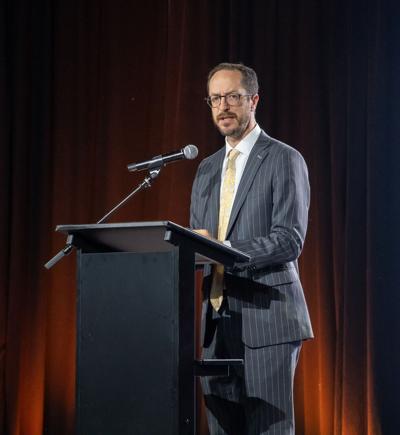
Mayor Freddie O'Connell
This story is a partnership between the Nashville Banner and the Nashville Post. The Nashville Banner is a nonprofit, nonpartisan news organization focused on civic news. Visit nashvillebanner.com for more information.
A few months after winning a crowded mayoral race, Mayor Freddie O’Connell continues his pivot to managing the city, faced with revenue forecasts that cannot be cured by campaign promises. On Wednesday, for the first time, he presented his annual budget proposal to the Metro Council.
Taking into account projected flat revenue growth — a departure from recent cycles that saw yearly increases — the administration is proposing a 2024-25 spending plan with few bells and whistles or major changes, as the Banner reported last month. The city is projecting $3.28 billion in revenue in the coming fiscal year. (The current year’s budget is $3.22 billion.)
Now the Metro Council has until the end of June to debate — and potentially change — the budget proposal. An official public hearing and community listening sessions are planned in the coming weeks.
Among other line items, O’Connell proposes a 3.5 percent cost-of-living adjustment for Metro employees and asks city departments to find a collective 1.4 percent in savings for next year as the city seeks to “live within our means,” says Metro budget officer Aaron Pratt.
“As many of you know, this was a challenging budget cycle for many reasons,” O’Connell told the budget committee on Wednesday. “Our revenues are expected to be nearly the same as last year, so our spending will be nearly the same as well. This means we can’t accomplish everything we want in a single year, but we do some important things.”
Finance officials expect no growth next year
In April, Metro Human Resources recommended a 3.5 percent cost-of-living adjustment (COLA) for most Metro employees, in addition to a 3 percent merit raise for qualifying employees. However, the Metro Civil Service Commission upped the recommended COLA to 4 percent as representatives for different groups of Metro employees argued the increase was insufficient to keep up with inflation. O’Connell is proposing HR’s 3.5 percent COLA.
The increases are expected to raise the pay floor for Metro employees to $20 per hour. That’s less than the $23 figure (up more than $5 from the mark of the year prior) identified by the living wage calculator used by Metro. But city officials said last month they are working on a rolling average for the pay floor due to year-over-year fluctuations in the living wage calculator. (O’Connell’s remarks celebrated the “living wage” pay floor regardless.)
Last month, the Metro Nashville Public Schools board approved a recommendation of a $1.27 billion “continuity of operations” budget, a 5.2 percent increase from the figure of the current year. The school system is focused on backfilling funding for programs initially supported by temporary federal expenditures, officials said last month, and O’Connell committed Wednesday to funding some of those initiatives. The mayor’s proposed education allocation is $1.25 billion, nearly 40 percent of the city budget, including funding for a 3.5 percent cost-of-living adjustment for school employees.
O’Connell also proposes to continue $30 million in annual funding for the Barnes Housing Trust Fund, though the dollars will come from multiple sources. Other funding has been set aside to help establish a standalone department of solid waste.
On the revenue front, Metro also faces challenges experienced by the state and other local governments, as federal funds on offer during the pandemic recovery dry up and consumer spending returns to more normal levels. That means limited or no growth in the city’s budget, set to take effect July 1. The 1.4 percent in savings baked into the budget could come from open positions remaining vacant, Pratt says. However, the administration wants to be “nimble and flexible” in working with departments to find savings throughout the year.
“We used every existing revenue source to make sure we can stay within our current fiscal footprint,” Pratt says.
Finance Director Kevin Crumbo stresses that the revenue situation is not dire. Asked about the prospect of selling real estate assets to pay down debt, he says, “We’re in no position where that even needs to be a thought.”
Still, Crumbo told the Banner last month that a property tax rate increase — not envisioned in the current proposal — could likely be on the table a year from now.
Though mayors typically introduce their proposed budget in the State of Metro address, O’Connell has instead opted to introduce the budget now and hold his first State of Metro in two weeks. Some initial budget information has been posted online, with more detailed documents expected in the coming days.
“Even though the city’s revenue projections are not showing growth as significant as we’ve seen over the past few years, which we’ve been acknowledging for months now, our priorities are intact,” O’Connell told the council committee. “We’re addressing our cost of living and the affordability of Nashville in response to feedback we’ve heard from residents in every Metro Council district. This is a budget that puts people first in many ways.”






